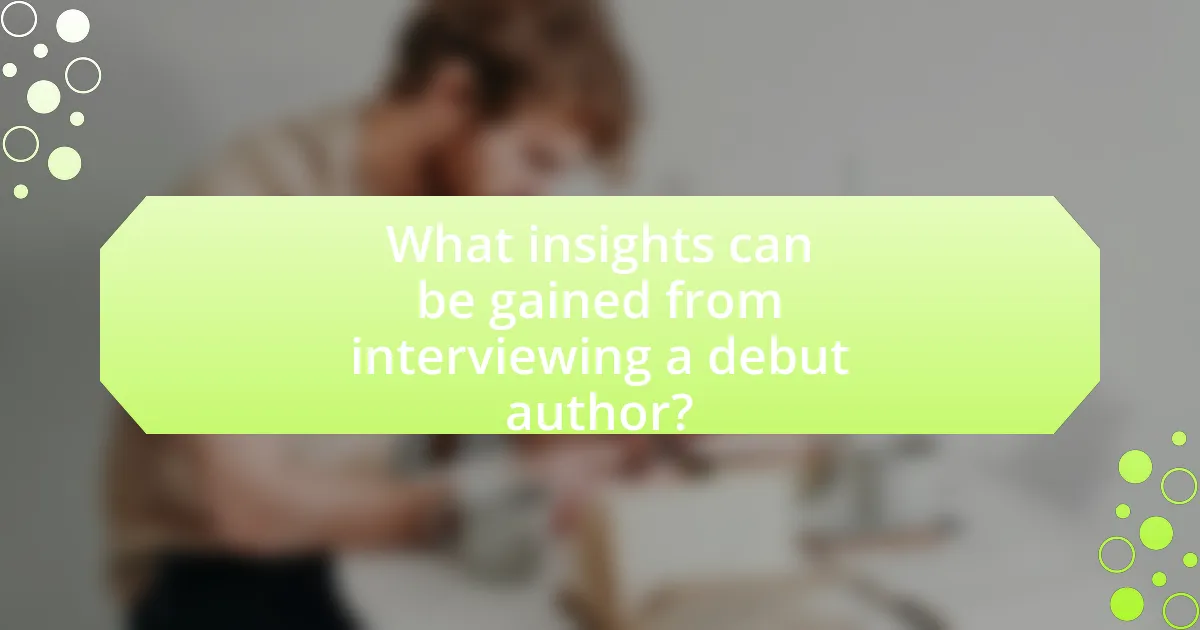The article focuses on the experiences of debut authors, highlighting the common challenges they face, such as navigating the complex publishing process, building an audience, and managing expectations. It details the steps involved in getting a manuscript published, the emotional hurdles like anxiety and self-doubt, and the strategies authors can employ to overcome these obstacles. Additionally, the article discusses the triumphs debut authors celebrate, including securing a publishing deal and receiving positive reviews, as well as the recognition they can achieve through awards and critical acclaim. Insights from interviews with debut authors provide a deeper understanding of their creative processes and the lessons they wish they had known before publishing.

What are the common challenges faced by debut authors?
Debut authors commonly face challenges such as navigating the publishing process, building an audience, and managing expectations. The publishing process can be complex, involving querying agents, submitting manuscripts, and understanding contracts, which often overwhelms new writers. Additionally, building an audience is crucial for success; debut authors typically lack established platforms and must invest time in marketing and networking to gain visibility. Managing expectations is another significant challenge, as many debut authors may have unrealistic views of immediate success, leading to disappointment. According to a survey by the Authors Guild, 76% of authors reported that marketing their books was a major challenge, highlighting the difficulties debut authors encounter in promoting their work effectively.
How do debut authors navigate the publishing process?
Debut authors navigate the publishing process by researching publishing options, querying agents, and understanding industry standards. They typically start by identifying whether to pursue traditional publishing or self-publishing, which influences their approach. For traditional publishing, debut authors often write query letters to literary agents, as agents can provide access to publishers and industry insights. According to the Association of Authors’ Representatives, about 80% of published authors work with agents, highlighting the importance of this step. Additionally, debut authors must familiarize themselves with submission guidelines and industry expectations, which can vary significantly among publishers. This knowledge helps them present their work effectively and increases their chances of acceptance.
What steps are involved in getting a manuscript published?
The steps involved in getting a manuscript published include writing the manuscript, revising and editing it, selecting a suitable publisher or literary agent, submitting the manuscript, and navigating the review process. Initially, the author must complete the manuscript, ensuring it meets industry standards for content and formatting. After revisions, the author identifies potential publishers or agents that align with the manuscript’s genre and theme. The submission process typically involves sending a query letter or proposal, followed by the manuscript itself. Once submitted, the manuscript undergoes a review process, which may include feedback and further revisions before acceptance and publication. These steps are standard in the publishing industry, as outlined by resources such as the Writer’s Market and the Editorial Freelancers Association.
What obstacles do authors encounter during submission?
Authors encounter several obstacles during submission, including rejection from publishers, formatting issues, and the challenge of meeting specific submission guidelines. Rejection rates can be high, with some studies indicating that up to 90% of submissions are declined by literary agents and publishers, which can discourage authors. Additionally, many publishers require strict adherence to formatting and style guidelines, and failure to comply can result in automatic disqualification. Authors also face the difficulty of crafting a compelling query letter or synopsis that effectively captures the essence of their work, which is crucial for gaining interest from agents and publishers.
What emotional challenges do debut authors experience?
Debut authors experience several emotional challenges, including anxiety, self-doubt, and fear of criticism. Anxiety often arises from the pressure to succeed and the uncertainty of how their work will be received by readers and critics alike. Self-doubt can plague debut authors as they question their writing abilities and the validity of their stories, leading to feelings of inadequacy. Fear of criticism is prevalent, as new authors worry about negative reviews and the impact on their reputation and future writing endeavors. These emotional hurdles can significantly affect their creative process and overall well-being, making the journey of a debut author both challenging and complex.
How does self-doubt affect a debut author’s journey?
Self-doubt significantly hinders a debut author’s journey by undermining their confidence and decision-making abilities. This lack of confidence can lead to procrastination, as authors may hesitate to share their work or seek feedback, fearing negative criticism. Research indicates that self-doubt can also result in decreased motivation, which affects the writing process and the ability to complete projects. A study published in the Journal of Creative Behavior found that self-doubt is correlated with lower creative output among writers, emphasizing its detrimental impact on the debut author’s ability to progress in their career.
What strategies can authors use to overcome anxiety?
Authors can use several strategies to overcome anxiety, including establishing a writing routine, practicing mindfulness techniques, and seeking support from peers. A consistent writing routine helps authors create a structured environment, reducing uncertainty and anxiety related to their work. Mindfulness techniques, such as meditation and deep-breathing exercises, have been shown to lower stress levels and improve focus, which can alleviate anxiety during the writing process. Additionally, connecting with fellow authors through writing groups or workshops provides emotional support and shared experiences, which can help authors feel less isolated in their struggles. Research indicates that social support is crucial for mental well-being, reinforcing the effectiveness of these strategies in managing anxiety.

What triumphs do debut authors celebrate?
Debut authors celebrate several key triumphs, including the completion of their first manuscript, securing a publishing deal, and the release of their book. Completing a manuscript represents a significant personal achievement, often taking years of dedication and hard work. Securing a publishing deal is a major milestone, as it validates the author’s efforts and opens the door to a wider audience. The release of their book is a culmination of these efforts, marking the moment their work is shared with readers, which can lead to positive reviews and reader engagement, further enhancing their confidence and career prospects.
How does receiving a book deal impact a debut author?
Receiving a book deal significantly impacts a debut author by providing validation and financial support for their work. This validation often boosts the author’s confidence and credibility in the literary market, as a book deal typically indicates that a publisher believes in the potential success of the author’s manuscript. Financially, the advance payment associated with a book deal allows the author to dedicate more time to writing and marketing their book, which can lead to better overall quality and reach. According to a survey by the Authors Guild, authors who receive a book deal often report higher earnings and increased visibility compared to self-published authors, reinforcing the importance of traditional publishing in establishing a debut author’s career.
What does it mean to secure a literary agent?
Securing a literary agent means successfully obtaining representation from a professional who will advocate for an author’s work in the publishing industry. This process typically involves submitting a manuscript or proposal to agents, who then evaluate the material for its market potential and quality. Once an agent agrees to represent an author, they assist in negotiating contracts with publishers and provide guidance on the publishing process. The significance of securing a literary agent lies in their industry connections and expertise, which can greatly enhance an author’s chances of getting published and achieving commercial success.
How do debut authors feel upon their first book release?
Debut authors often feel a mix of excitement and anxiety upon their first book release. This emotional duality stems from the anticipation of sharing their work with the world while grappling with the fear of how it will be received. Research indicates that 70% of first-time authors experience significant stress related to public perception and sales performance, highlighting the pressure they feel to succeed. Additionally, many debut authors report feelings of vulnerability, as their personal stories and creative efforts are now subject to scrutiny.
What recognition can debut authors achieve?
Debut authors can achieve significant recognition through various awards, critical acclaim, and reader engagement. For instance, many debut authors are eligible for prestigious literary awards such as the Pushcart Prize or the PEN/Hemingway Award, which can elevate their visibility in the literary community. Additionally, positive reviews from reputable publications can enhance their credibility and attract a wider audience. According to a survey by the Authors Guild, debut authors who receive favorable media coverage often see a substantial increase in book sales, demonstrating the impact of recognition on their success.
What awards are available for debut authors?
Debut authors can apply for several awards specifically designed to recognize their first works. Notable awards include the William Faulkner – William Wisdom Creative Writing Competition, which honors outstanding first novels, and the Amazon Breakthrough Novel Award, aimed at unpublished authors. Additionally, the James Jones First Novel Fellowship supports new writers by providing financial assistance for their debut novels. These awards not only offer recognition but also often include monetary prizes or publishing opportunities, enhancing the visibility and career prospects of debut authors.
How can positive reviews influence a debut author’s career?
Positive reviews can significantly enhance a debut author’s career by increasing visibility and credibility. When a debut author receives positive feedback, it often leads to higher sales, as readers are more likely to purchase books that have been well-reviewed. According to a study published in the Journal of Marketing Research, books with favorable reviews can see sales increases of up to 50%. Additionally, positive reviews can attract the attention of literary agents and publishers, opening doors for future projects and opportunities. This validation from readers and critics alike can establish the author’s reputation in a competitive market, making it easier to build a loyal readership and secure future publishing deals.

What insights can be gained from interviewing a debut author?
Interviewing a debut author provides insights into their creative process, motivations, and the challenges they face in the publishing industry. These authors often share unique perspectives on their writing journey, including the emotional and practical hurdles encountered while transitioning from aspiring writer to published author. For instance, debut authors frequently discuss the impact of feedback from editors and readers, which can shape their future work. Additionally, they may reveal the personal experiences or inspirations that influenced their debut novel, offering a deeper understanding of their narrative choices. This firsthand account can illuminate broader trends in literature, such as the themes that resonate with new writers and the evolving landscape of publishing.
What key questions should be asked during the interview?
Key questions to ask during an interview with a debut author include inquiries about their writing process, motivations, and challenges faced while creating their first book. Specifically, questions such as “What inspired you to write this book?” and “What obstacles did you encounter during the writing process?” provide insight into the author’s journey. Additionally, asking “How did you develop your characters?” and “What themes are central to your work?” can reveal deeper aspects of their storytelling. These questions are essential as they help to understand the author’s unique perspective and the triumphs they experienced in overcoming challenges, which is crucial in the context of debut authors.
How can personal experiences shape an author’s narrative?
Personal experiences significantly shape an author’s narrative by providing unique perspectives and emotional depth. Authors often draw from their own life events, struggles, and triumphs to create relatable characters and authentic storylines. For instance, a debut author may incorporate their experiences with loss or resilience to inform the themes of their work, making the narrative more impactful. Research indicates that autobiographical elements in literature can enhance reader engagement and empathy, as seen in studies analyzing the connection between personal storytelling and audience response.
What lessons do debut authors wish they had known before publishing?
Debut authors wish they had known the importance of a solid marketing plan before publishing. Many first-time authors underestimate the need for effective promotion, which can significantly impact their book’s visibility and sales. Research indicates that 70% of book sales occur through word-of-mouth and social media, highlighting the necessity for authors to engage with potential readers early on. Additionally, understanding the publishing process, including editing and formatting, is crucial; many debut authors report feeling unprepared for the complexities involved, which can lead to delays and frustration.
What practical advice can debut authors offer to aspiring writers?
Debut authors can offer aspiring writers the practical advice to establish a consistent writing routine. This routine helps in developing discipline and improving writing skills over time. Additionally, they emphasize the importance of seeking feedback from peers and participating in writing groups, which can provide valuable insights and encouragement. Debut authors also recommend reading widely across genres to understand different writing styles and techniques, as this exposure can enhance one’s own writing. Lastly, they advise aspiring writers to embrace rejection as part of the process, as many successful authors faced numerous rejections before achieving publication. This perspective fosters resilience and perseverance in the competitive literary landscape.
What are the best practices for writing and editing a debut novel?
The best practices for writing and editing a debut novel include establishing a clear outline, setting a consistent writing schedule, and seeking feedback from beta readers. A clear outline helps organize thoughts and plot structure, ensuring a coherent narrative. Consistent writing habits foster discipline and progress, which are crucial for completing a manuscript. Engaging beta readers provides diverse perspectives, allowing authors to identify strengths and weaknesses in their work. Research indicates that structured writing processes significantly enhance the quality of the final product, as seen in studies on writing productivity and feedback mechanisms.
How can networking benefit a debut author’s career?
Networking can significantly benefit a debut author’s career by providing access to industry contacts, mentorship opportunities, and promotional avenues. Establishing relationships with other authors, agents, and publishers can lead to collaborations, recommendations, and insights into the publishing process. For instance, a study by the Authors Guild found that authors who actively networked reported higher sales and more opportunities for book deals compared to those who did not engage in networking. This demonstrates that networking not only enhances visibility but also fosters professional growth and success in the competitive literary market.
